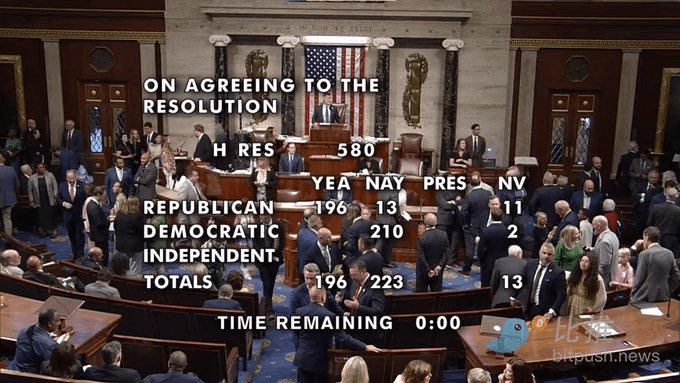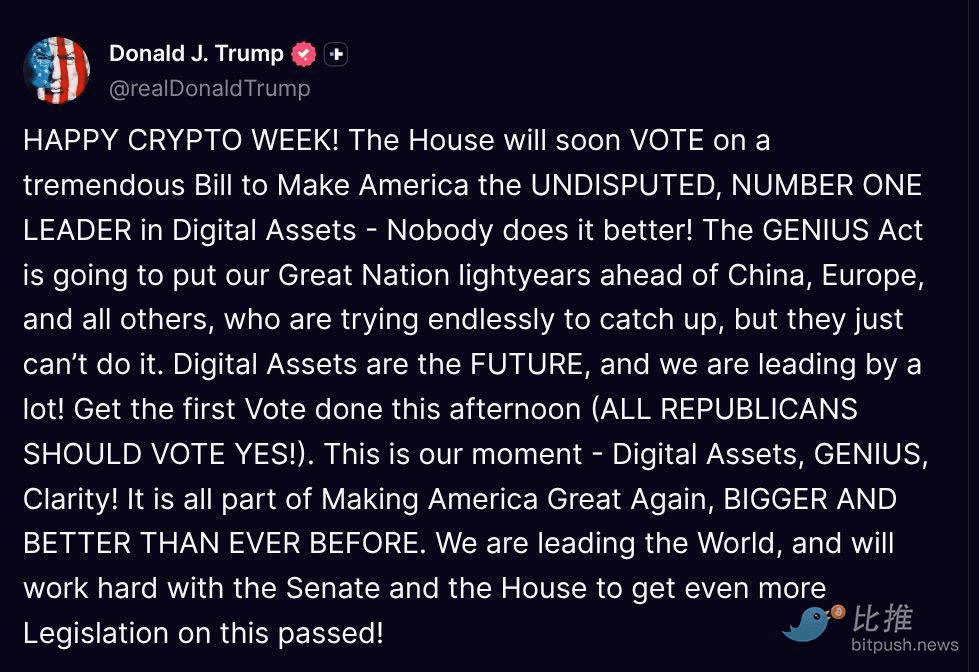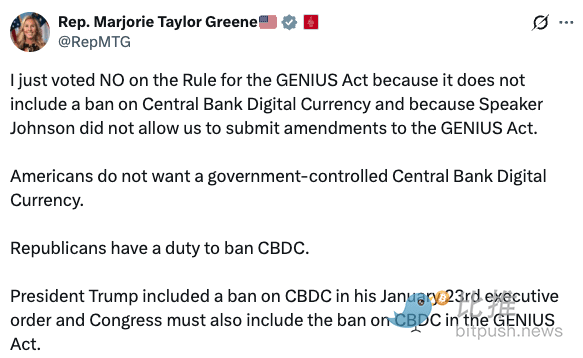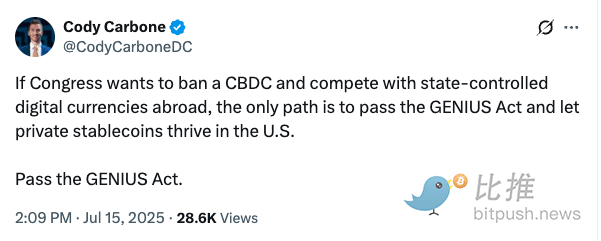Written by: BitpushNews
What was seen as the 'high point' for the cryptocurrency industry in Washington - 'Crypto Week' - unexpectedly stumbled on Tuesday, as three cryptocurrency regulatory bills pushed by Trump faced an unexpected setback in procedural voting.

The voting result on Tuesday was 196 votes in favor and 223 votes against. Among them, 13 Republican representatives voted against alongside the Democrats, jointly blocking the procedural motion to debate and advance this deciding bill.
This means that, unless the House passes the related procedural rules again, these bills carrying the hopes of the industry will not enter substantial debate.
'Crypto Week' vision: Trump personally overseeing the battle.
Earlier this week, the sentiment in Washington's crypto industry was high, with expectations that these bills would pass smoothly.
Trump himself also rallied for 'Crypto Week' on his 'Truth Social' platform, portraying it as a key step for the U.S. to become the 'undisputed number one leader' in the digital asset field. He called on all Republican representatives to vote in favor, firmly believing that 'the GENIUS Act will put our great nation ahead of China, Europe, and all other countries by light years, and they are endlessly trying to catch up, but just can't.'

The blocked cryptocurrency legislative 'package' includes three bills critical to the industry:
GENIUS Act: This bill on stablecoin regulation received some Democratic support last month in the Senate and successfully passed. It aims to provide a clear regulatory framework for stablecoins and is seen as a key to unlocking broader institutional adoption.
CLARITY Act: This bill aims to clarify the classification rules for digital assets, specifying which assets should be regulated as securities by the U.S. Securities and Exchange Commission (SEC) and which should be regulated as commodities by the Commodity Futures Trading Commission (CFTC), in order to end the long-standing 'regulatory gray area' troubling the industry.
Ban on Central Bank Digital Currency (CBDC) Act: This proposal aims to prohibit the Federal Reserve from creating a Central Bank Digital Currency, reflecting some members' concerns over government control of digital currency.
These bills are viewed as the cornerstone for establishing a comprehensive and predictable regulatory framework for digital assets in the U.S., and their passage could bring much-needed certainty to the market, attracting more capital and innovation.
Dissent within the Republican Party emerges.
The most striking aspect of this vote was the 'defection' of 13 Republican representatives. According to The Hill, several Republican representatives, including Marjorie Taylor Greene, Chip Roy, Michael Cloud, and Anna Paulina Luna, cast votes against.
Georgia's Marjorie Taylor Greene publicly explained her position on social media.
She stated that the (GENIUS Act) failed to include a ban on Central Bank Digital Currencies (CBDC), and Speaker Johnson did not allow related amendments to be submitted. Greene emphasized that Trump included the CBDC ban in his executive order on January 23, so Congress must include it in the (GENIUS Act); she believes 'Americans do not need a government-controlled Central Bank Digital Currency.'

House Speaker Johnson found himself in a dilemma. After the vote failed, he stated that Republicans 'are still in dialogue, answering questions,' trying to appease and gain the support of these conservatives.
However, he also admitted that bundling all three bills (especially the stablecoin bill already passed by the Senate and the CBDC ban bill demanded by hardliners) into one 'package' is not feasible. A senior Republican lawmaker bluntly stated: 'Bundled voting will only cause these bills to fail in the Senate.' This statement reflects the strategic dilemma the Republican leadership faces in balancing the demands of different factions within the party and ensuring legislative feasibility.
Subsequent voting suspense: compromise or deadlock?
After the news of the voting failure broke, stocks related to cryptocurrency fell sharply: stablecoin issuer Circle's stock dropped over 7%, cryptocurrency exchange Coinbase fell over 4%, and digital asset company MARA Holdings' stock also dropped by 2%.

House Speaker Johnson has announced hopes to restart procedural voting on the crypto bills on Wednesday local time. The Louisiana Republican told reporters as he left the Capitol that the party is still 'continuing communication, answering lawmakers' concerns' and emphasized that 'these crypto bills are a joint priority of the White House, Senate, and House.' According to Fox News, Trump himself expressed being very 'angry' about the voting results and is communicating with relevant lawmakers.
Nevertheless, some industry analysts remain optimistic about the future of the bill. TD Cowen policy analyst Jaret Seiberg noted in a report to clients: 'We are likely to vote on the rules again in the House tomorrow (Wednesday). If it doesn't happen tomorrow, it may need to be postponed until next week.' Seiberg further stated that he still expects the House to pass the (GENIUS Act), citing 'Trump is pushing for its enactment.' He believes that even if members of the House 'Freedom Caucus' oppose accepting the Senate version of the bill, they may ultimately concede at the president's request.

Digital Chamber CEO Cody Carbone is also confident about the final passage of the bill. He pointed out on social media that the best way to address the CBDC ban is through the (GENIUS Act): 'If lawmakers are interested in banning CBDC and competing with digital currencies issued by other countries, then the way to do it is through the (GENIUS Act) and allow the private stablecoin market to flourish in the U.S.'
This setback confirms a reality: in Washington, even a president's pushed agenda can fall victim to the delicate internal power balance. When technological innovation meets political maneuvering, the 'path to compliance' for cryptocurrency is bound to be bumpy.
